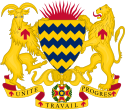 |
|---|
Territorial Assembly elections were held in Chad on 30 March 1952. [1] The result was a victory for Gaullist parties, [2] with the Rally of the French People winning all 15 seats in the First College and the Chadian Democratic Union winning 24 of the 30 seats in the Second College.
Contents
In the southern town of Bébalem, the announcement of the PPT's defeat by the UDT (with the latter being close to colonial and traditional elites) led to farmer protests and the subsequent Bébalem massacre by colonial authorities. [3] [4]